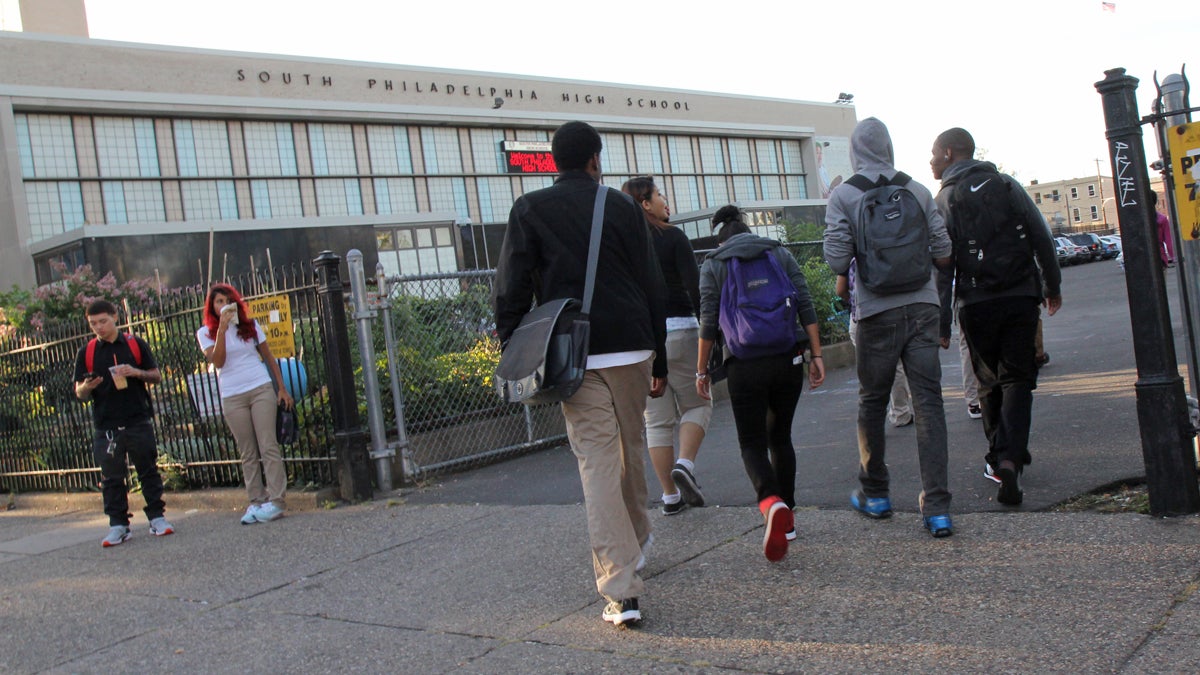Pew poll: Most Philly residents give public schools poor grade

Students enter South Philadelphia High School on the first day of class Monday, Sept. 9, 2013. (Kimberly Paynter/WHYY)
[Updated] The Philadelphia School District’s financial woes appear to have to have badly bruised its reputation, according to a new survey released by the Pew Charitable Trusts.
Fifty-two percent of the poll’s respondents graded the public school system “poor,” up from 35 percent last year. Only 18 percent deemed it “good” or “excellent.”
“This is the lowest positive rating for the schools in the five years that Pew has been polling on this topic,” said Larry Eichel, a director of Pew’s Philadelphia program. “It seems to me that this funding crisis has gotten more attention, and has been generally seen as a more significant event than some of [the school district’s budget problems] in the past.”
Forty-eight percent of residents polled said they would not endorse Philadelphia as a place to raise kids.
Young adults, who Eichel said helped power the city’s population boom in recent years, had an even more negative outlook. Fifty-five percent would not recommend Philadelphia for child-rearing. Eichel said their low opinion could potentially slow the growth of Philadelphia.
“That’s one of the messages, I think, that comes out this poll,” he said. “Young adults, in particular, are very concerned about the school system.”
As for independently-run charter schools, almost two-thirds of residents said they see them as a positive force in the city. Twenty-six percent said they lack oversight and siphon taxpayer money from public schools.
More than one-third of respondents said they are definitely or probably going to flee the city in the next five to 10 years. The top reasons cited were concerns about jobs (29 percent), crime and safety (25 percent), and child-raising and schooling issues (23 percent).
Of the respondents’ main concerns, Rutgers University political science professor Cliff Zukin said, “It really does put on the table an agenda for the city.” The longtime pollster, along with Abt SRBI Public Affairs, helped design and conduct the survey, which has a margin of error of plus or minus 2.5 percentage points.
The results are based on cell phone and landline interviews with 1,605 city residents from late July to mid-August. On Aug. 8, Superintendent William Hite threatened to delay the opening of Philadelphia’s schools unless the district received assurances that an extra $50 million in local funding was on the way.
Mayor Michael Nutter and City Council pledged to provide more money and, although they are still fighting over how to best do that, classes kicked off last week. The district currently has 3,000 fewer assistant principals, guidance counselors, teachers and other school employees than in June, as a result of both widespread layoffs and attrition.
Thirty-one percent of residents said Nutter and Council are most to blame for the district’s budget woes. The same percentage identified Pennsylvania Gov. Tom Corbett and the state Legislature as the primary culprits, while only 11 percent said the district’s labor unions bear most of the responsibility.
Because the poll did not ask respondents why they faulted city or state officials more for the funding crisis, Eichel declined to speculate about why the two received equal blame. The city has boosted yearly aid to the school district by $155 million since mid-2010, while the state has cut $145 million, according to Nutter’s aides.
Many local education advocates have said that the state is most responsible for the district’s budget crisis. But some also condemn Nutter and Council for a variety of reasons, such as feuding over the source of the $50 million.
The Pew poll was conducted before the Philadelphia Federation of Teachers released a series of ads lambasting Nutter and Corbett for the school district’s financial crisis. The teachers union is being asked to accept wage, health-care and work-rule concessions to help shore up the budget.
According to last month’s Franklin & Marshall College survey, only 20 percent of registered voters believe Corbett deserves to be re-elected next year. His poor public image has been attributed, in part, to cuts in education funding.
Read the complete findings from Pew Charitable Trusts below.
DV.load(“//www.documentcloud.org/documents/791773-pew-poll-philly-schools.js”, {
width: 600,
height: 800,
sidebar: false,
text: false,
container: “#DV-viewer-791773-pew-poll-philly-schools”
});
WHYY is your source for fact-based, in-depth journalism and information. As a nonprofit organization, we rely on financial support from readers like you. Please give today.

